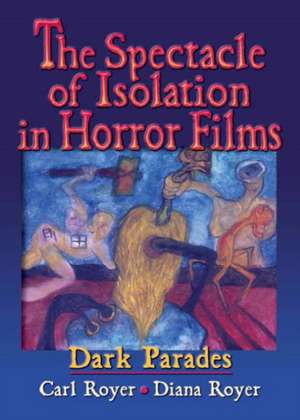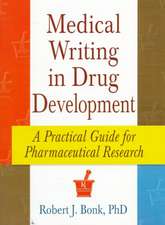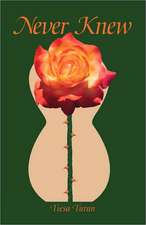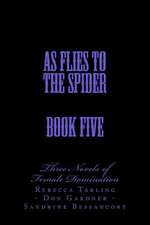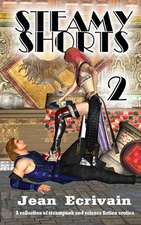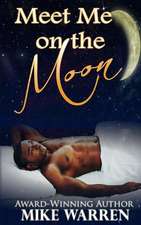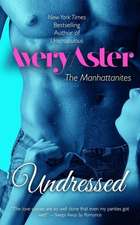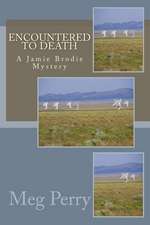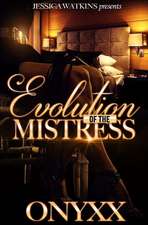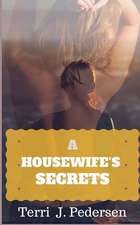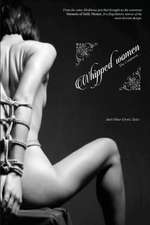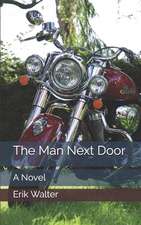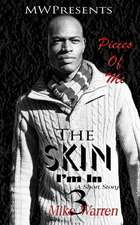The Spectacle of Isolation in Horror Films: Dark Parades
Autor Carl Royer, B. Lee Cooperen Limba Engleză Paperback – 28 iun 2005
The Spectacle of Isolation in Horror Films: Dark Parades examines the work of several of the genre’s most influential directors and investigates how traditional themes of isolation, alienation, death, and transformation have helped build the foundation of horror cinema. Authors Carl and Diana Royer examine the techniques used by Alfred Hitchcock that place his work squarely in the horror (rather than suspense) genre, discuss avant-garde cinema’s contributions to mainstream horror, explore films that use the apartment setting as the “cell of horror,” and analyze how angels and aliens function as the supernatural “Other.” A unique resource for film students and film buffs alike, the book also examines Sam Raimi’s Evil Dead trilogy and the fusion of science, technology, and quasi-religious themes in David Cronenberg’s films.
Instead of presenting a general overview of the horror genre or an analysis of a specific sub-genre, actor, or director, The Spectacle of Isolation in Horror Films offers an imaginative look at classic and contemporary horror cinema. The book examines Surrealist films such as Un Chien Andalou and Freaks, the connections among the concepts of voyeurism, paranoia, and alienation in films like Rear Window, Rosemary’s Baby, Blue Velvet, and The Blair Witch Project; the use of otherworldly creatures in films such as The Prophecy, Dogma, and The Day The Earth Stood Still; and the films of directors George Romero, John Waters, and Darren Aronofsky, to name just a few. This unique book also includes an extensive A-to-Z filmography and a bibliography of writings on, and about, horror cinema from filmmakers, film critics, and film historians.
The Spectacle of Isolation in Horror Films examines:
- “Body Doubles and Severed Hands”—the common ancestry of avant-garde “art” films and exploitation horror B-movies
- “And I Brought You Nightmares”—recurring themes of psychological terror in Alfred Hitchcock’s films
- “Horror, Humor, Poetry”—Sam Raimi’s transformation of “drive-in” horror cinema
- “Atheism and 'The Death of Affect'”—David Cronenberg’s obsessions, interests, and cautionary messages in films ranging from Videodrome to Dead Ringers to eXistenZ
- and much more!
Preț: 295.49 lei
Preț vechi: 380.98 lei
-22% Nou
Puncte Express: 443
Preț estimativ în valută:
56.55€ • 58.82$ • 46.68£
56.55€ • 58.82$ • 46.68£
Carte tipărită la comandă
Livrare economică 14-28 aprilie
Preluare comenzi: 021 569.72.76
Specificații
ISBN-13: 9780789022646
ISBN-10: 0789022648
Pagini: 138
Dimensiuni: 148 x 210 x 10 mm
Greutate: 0.26 kg
Ediția:1
Editura: Taylor & Francis
Colecția Routledge
Locul publicării:Oxford, United Kingdom
ISBN-10: 0789022648
Pagini: 138
Dimensiuni: 148 x 210 x 10 mm
Greutate: 0.26 kg
Ediția:1
Editura: Taylor & Francis
Colecția Routledge
Locul publicării:Oxford, United Kingdom
Cuprins
- Foreword (Philip L. Simpson)
- Preface
- Acknowledgments
- Chapter 1. Body Doubles and Severed Hands: The Relation Between Avant-Garde Cinema and Horror Movies
- Chapter 2. “And I Brought You Nightmares”: The Play of Horror in Hitchcock’s Films
- Chapter 3. Horror, Humor, Poetry: Sam Raimi’s Evil Dead Trilogy
- Chapter 4. The Darkness Is Not the Devil: Atheism and “The Death of Affect”
in the Films of David Cronenberg - Chapter 5. The Apartment As a Cell of Horror
- Chapter 6. Angels and Aliens: The Supernatural Other in Popular Consciousness
- Appendix: Filmography
- Bibliography
- Index
- Reference Notes Included
Descriere
The Spectacle of Isolation in Horror Films: Dark Parades examines the work of several of the genre's most influential directors and investigates how traditional themes of isolation, alienation, death, and transformation have helped build the foundation of horror cinema. Authors Carl and Diana Royer examine the techniques used by Alfred Hitchcock that place his work squarely in the horror (rather than suspense) genre, discuss avant-garde cinema's contributions to mainstream horror, explore films that use the apartment setting as the “cell of horror,” and analyze how angels and aliens function as the supernatural “Other.” A unique resource for film students and film buffs alike, the book also examines Sam Raimi's Evil Dead trilogy and the fusion of science, technology, and quasi-religious themes in David Cronenberg's films.
To view an excerpt online, find the book in our QuickSearch catalog at www.HaworthPress.com.
To view an excerpt online, find the book in our QuickSearch catalog at www.HaworthPress.com.
